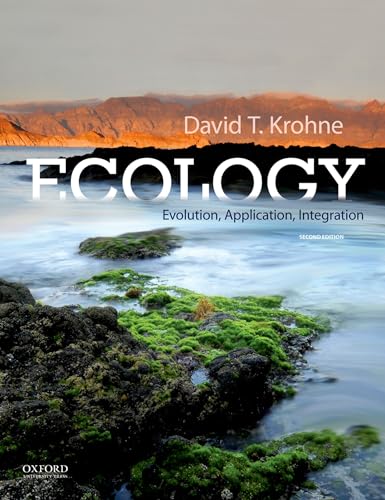Choosing the best ecology textbook can be overwhelming. There are many different options available, and it can be difficult to know which one will be the best for you. To speed up the buying process this page will help you make the right decision choosing the best ecology textbook. So, whether you are a student or a professor, this guide is sure to lead you towards the perfect ecology textbook for your studies.
Best Ecology Textbook
Best Ecology Textbook
Elements of Ecology 9th Edition
The Elements of Ecology (Buy Online) is the best ecology textbook available on the market today. The author has done an amazing job at explaining key concepts clearly while maintaining scientific accuracy across all chapters in addition to providing many extras such as quizzes and extra resources online so you can test your knowledge after reading each chapter.
We spent weeks researching the best ecology textbook, and we found that this one was far superior. It is more comprehensive than any other ecology textbook on the market today, with hundreds of color illustrations and graphs.
The text also provides a greater variety of opportunities for students to learn quantitative skills through worked examples and exercises throughout each chapter. And not only does this book cover all major topics in ecological systems adequately but it also encourages critical thinking skills by encouraging students to discuss their understanding with peers as well as instructors.
Overall, the Elements of Ecology textbook is affordable for every student, and it covers all of the important topics you need to know about environmental science. So we would highly recommend this book to anyone interested in succeeding in an undergraduate class and it also will prepare you for future careers as a biologist or ecologist.
Ecology: Evolution, Application, Integration 2nd Edition
If you are looking for a comprehensive ecology textbook, Ecology: Evolution, Application, Integration (Buy Online) is an excellent choice. The text covers a broad range of topics in ecology and features contributions from experts in the field.
The book starts with an introduction to adaptation and evolution and provides readers with a detailed look at how organisms adapt to their environment,
This is followed by chapters on terrestrial communities, which offer an overview of the different types of terrestrial ecosystems.
The freshwater and marine communities section takes a similar approach to aquatic ecosystems, while the behavioral ecology chapters cover the behavior of individual species within ecological systems.
The book then moves on to more complex topics like the ecology of intraspecific variation, which considers how genetic variation affects populations.
This is then followed by chapters on coevolution and mutualism that explore the dynamics between coevolving species, and the species diversity chapters look at different aspects of biodiversity and how they are guided by the environment.
Finally, the conservation biology section presents strategies on how ecologists can apply their skills to preserve and protect the biodiversity of our planet in the real world.
Ecology: Concepts and Applications 8th Edition
Ecology: Concepts and Applications (Buy Online) is an excellent resource for anyone studying ecology. The text provides in-depth explanations of key ecological concepts, and the accompanying images and examples help to clarify the material.
This book covers all of the major topics that are important to learning about ecology including life on land, life in water, population genetics and natural selection, adaptations to the environment, population ecology (population distribution and abundance; population dynamics; life history).
It also discusses interactions such as competition and mutualism at a more basic level than some other books do–but without sacrificing depth or clarity. Finally, it finishes up with topics like species diversity and community structure.
Ecology 5th Edition
Ecology (Buy Online) is one of the best-selling ecology textbooks and it teaches the fundamentals of ecology, with a particular focus on how organisms interact with their environment. The book covers many topics in detail, including physical environments, biospheres, coping mechanisms to environmental variation, evolutionary ecology, population distribution as well as behavioral ecosystems, and predator-prey interactions. If you want to learn more about Ecology–or are looking for some refresher material– this is a good book, but it’s not as comprehensive as The Elements of Ecology.
Related: Best Botany Textbooks
Ecology: From Individuals to Ecosystems 5th Edition
In Ecology: From Individuals to Ecosystems (Buy Online), you will learn about the different interactions that take place between species. It looks at competition, predation, parasitism, and disease, among other topics. The book does a great job of explaining how ecology works on a small scale before expanding out to larger systems. It also examines the impact of humans on ecosystems and discusses possible solutions for preserving our environment.
Ecology: The Economy of Nature Ninth Edition
The Economy of Nature (Buy Online) is the perfect textbook for introductory ecology courses. It provides a comprehensive overview of the field, with an evolutionary perspective and a focus on quantitative skills. This book also provides additional support with interactive features and access to constantly updated digital resources.
A Primer of Ecology 4th Edition
A Primer of Ecology (Buy Online) may be used as a self-teaching guide by students or as a primary textbook for an introductory course in ecology or conservation biology. It may also serve as a supplemental text for any general ecology textbook that does not present the mathematics behind the topics it covers.
Table of Contents














